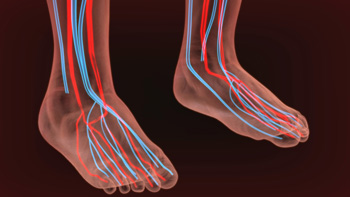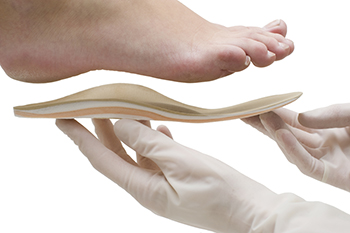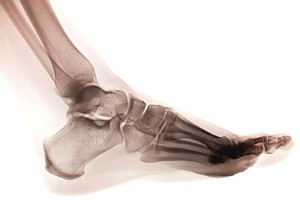Connect With Us
Blog
Signs of Poor Circulation

The circulatory system in the body is rarely thought about when it is working properly. Problems may occur when blood flow is restricted, and can cause reduced mobility, in addition to increasing the risk of a heart attack. A common cause of poor circulation is peripheral artery disease (PAD). One of the first signs of this condition can be pain in the feet and legs while walking, and this may be diminished by stretching and exercising at least three times per week. It is suggested to patients who smoke to stop or cut back, and people who are diabetic to control their sugar intake. A sign of poor circulation can include a wound on the foot that doesn't heal. Many people are unaware they may have cuts and scrapes on their feet as a result of the inability to feel sensations. Patients who are short of breath may be experiencing poor circulation, and this may be a subtle sign of a heart issue. If you have any of these symptoms, it is strongly suggested that you are under the care of a podiatrist who can offer you correct treatment options.
Poor circulation is a serious condition and needs immediate medical attention. If you have any concerns with poor circulation in your feet contact one of our podiatrists of Foot & Ankle Associates of Maine. Our doctors will treat your foot and ankle needs.
Poor Circulation in the Feet
Poor blood circulation in the feet and legs is can be caused by peripheral artery disease (PAD), which is the result of a buildup of plaque in the arteries.
Plaque buildup or atherosclerosis results from excess calcium and cholesterol in the bloodstream. This can restrict the amount of blood which can flow through the arteries. Poor blood circulation in the feet and legs are sometimes caused by inflammation in the blood vessels, known as vasculitis.
Causes
Lack of oxygen and oxygen from poor blood circulation restricts muscle growth and development. It can also cause:
- Muscle pain, stiffness, or weakness
- Numbness or cramping in the legs
- Skin discoloration
- Slower nail & hair growth
- Erectile dysfunction
Those who have diabetes or smoke are at greatest risk for poor circulation, as are those who are over 50. If you have poor circulation in the feet and legs it may be caused by PAD and is important to make changes to your lifestyle in order to reduce risk of getting a heart attack or stroke. Exercise and maintaining a healthy lifestyle will dramatically improve conditions.
As always, see a podiatrist as he or she will assist in finding a regimen that suits you. A podiatrist can also prescribe you any needed medication.
If you have any questions please feel free to contact our office located in Brunswick, ME . We offer the newest diagnostic and treatment technologies for all your foot and ankle needs.
Rigid Versus Soft Orthotics

Custom orthotics are shoe or heel inserts prescribed by a doctor to help with various foot problems. Orthotics are used to correct foot deformities, help feet or ankles function better, and reduce risk of injury. Podiatrists can recommend custom orthotics as part of treatment plans for patients suffering from arthritis, bunions, flat feet or high arches, hammertoes, heel spurs, and plantar fasciitis. The type of material used for the orthotic determines how stiff it is. Rigid orthotics are usually made of a hard plastic or carbon fiber and provide more stability and support but may be less comfortable than softer orthotics. Softer orthotics are more flexible because they bend with your feet. Each type is appropriate for different foot conditions. Rigid orthotics are good for those who have plantar fasciitis or Achilles tendonitis. This type of orthotic takes more time to adjust to but over time becomes more comfortable. Soft orthotics are usually made of EVA (a more rubber-like material) and fit more closely against the foot than rigid orthotics. They are used for those who have heel pain as they mold to hurt areas and cushion sore spots. Soft orthotics are good for those who participate in high impact sports where the feet move quickly. Consulting with a podiatrist takes the decision of which type of orthotic is best for you out of your hands as they are experts in diagnosing foot problems and offering treatment options that fit your unique needs.
If you are having discomfort in your feet and would like to try orthotics, contact one of our podiatrists from Foot & Ankle Associates of Maine. Our doctors can provide the care you need to keep you pain-free and on your feet.
What Are Orthotics?
Orthotics are inserts you can place into your shoes to help with a variety of foot problems such as flat feet or foot pain. Orthotics provide relief and comfort for minor foot and heel pain but can’t correct serious biomechanical problems in your feet.
Over-the-Counter Inserts
Orthotics come in a wide variety of over-the-counter inserts that are used to treat foot pain, heel pain, and minor problems. For example, arch supports can be inserted into your shoes to help correct overarched or flat feet, while gel insoles are often used because they provide comfort and relief from foot and heel pain by alleviating pressure.
Prescription Orthotics
If over-the-counter inserts don’t work for you or if you have a more severe foot concern, it is possible to have your podiatrist prescribe custom orthotics. These high-quality inserts are designed to treat problems such as abnormal motion, plantar fasciitis, and severe forms of heel pain. They can even be used to help patients suffering from diabetes by treating foot ulcers and painful calluses and are usually molded to your feet individually, which allows them to provide full support and comfort.
If you are experiencing minor to severe foot or heel pain, it’s recommended to speak with your podiatrist about the possibilities of using orthotics. A podiatrist can determine which type of orthotic is right for you and allow you to take the first steps towards being pain-free.
If you have any questions please contact our office located in Brunswick, ME . We offer the newest diagnostic and treatment technologies for all your foot and ankle needs.
How to Prevent Running Injuries

Injuries of any kind are not fun, and they are particularly frustrating when you enjoy running for exercise or are trying to build your training regimen in preparation for a big race. Though most running injuries happen from overuse, some occur because of falls or other accidents. Common running injuries include knee pain, shin splints, and plantar fasciitis causing heel pain. Thankfully, most running injuries are preventable. Cultivating good habits should be a first step in preventing such injuries. These include doing warm up stretching and strengthening exercises prior to running, wearing good running shoes (and replacing them regularly), building up speed and distance slowly, taking rest days, maintaining good running form, keeping attention and awareness while running, staying properly hydrated, and changing up terrain. If you are a runner and suffer from foot or ankle pain or get injured, a podiatrist can help diagnose the problem and come up with a treatment plan that will help you get back to your sport as quickly as possible.
Exercising your feet regularly with the proper foot wear is a great way to prevent injuries. If you have any concerns about your feet, contact one of our podiatrists of Foot & Ankle Associates of Maine. Our doctors will treat your foot and ankle needs.
How to Prevent Running Injuries
Many common running injuries are caused by overuse and overtraining. When the back of the kneecap starts wearing out and starts causing pain in your knee, this is commonly referred to as runner’s knee. Runner’s knee is a decrease in strength in your quadriceps and can occur if you’re not wearing properly fitted or supporting shoes. To prevent runner’s knee, focusing on hip strengthening is a good idea, as well as strengthening your quads to keep the kneecaps aligned.
What Are Some Causes of Running Injuries?
- One cause of a common running injury is called iliotibial band syndrome.
- Plantar fasciitis is also another common injury.
- Stress fractures can occur from overtraining, lack of calcium, or even your running style.
Best Ways to Prevent Running Injuries
- Wear footwear that fits properly and suits your running needs.
- Running shoes are the only protective gear that runners have to safeguard them from injury.
- Make a training schedule. Adding strengthening exercises as well as regular stretching can help keep you strong and limber and can lessen the possibility of injuries.
- Stretching keeps muscles limber; this will help you gain better flexibility.
If you have any questions please feel free to contact our office located in Brunswick, ME . We offer the newest diagnostic and treatment technologies for all your foot and ankle needs.
Symptoms and Causes of Tarsal Tunnel Syndrome

The tibial nerve is located in the ankle and runs through the tarsal tunnel. This is a passageway in the ankle that is made of bones and ligaments. Tarsal tunnel syndrome occurs when the tibial nerve becomes compressed and may happen from overusing the foot and ankle. Common symptoms include a tingling or numbing feeling on the bottom of the foot, and there may be a burning sensation. It may worsen with prolonged standing or walking and may lessen when the affected foot is elevated. Tarsal tunnel syndrome may occur from having a cyst in the foot, severe flat feet, or possibly from an ankle deformity following an injury. Non-surgical treatment includes wearing orthotics and stopping the activity that caused the syndrome. If surgery is an option, healing time takes approximately two weeks. If you have chronic pain in the sole of your foot, please consider seeing a podiatrist for a proper diagnosis and treatment options.
Tarsal tunnel syndrome can be very uncomfortable to live with. If you are experiencing tarsal tunnel syndrome, contact one of our podiatrists of Foot & Ankle Associates of Maine. Our doctors can provide the care you need to keep you pain-free and on your feet.
Tarsal Tunnel Syndrome
Tarsal tunnel syndrome, which can also be called tibial nerve dysfunction, is an uncommon condition of misfiring peripheral nerves in the foot. The tibial nerve is the peripheral nerve in the leg responsible for sensation and movement of the foot and calf muscles. In tarsal tunnel syndrome, the tibial nerve is damaged, causing problems with movement and feeling in the foot of the affected leg.
Common Cause of Tarsal Tunnel Syndrome
- Involves pressure or an injury, direct pressure on the tibial nerve for an extended period of time, sometimes caused by other body structures close by or near the knee.
- Diseases that damage nerves, including diabetes, may cause tarsal tunnel syndrome.
- At times, tarsal tunnel syndrome can appear without an obvious cause in some cases.
The Effects of Tarsal Tunnel Syndrome
- Different sensations, an afflicted person may experience pain, tingling, burning or other unusual sensations in the foot of the affected leg.
- The foot muscles, toes and ankle become weaker, and curling your toes or flexing your foot can become difficult.
- If condition worsens, infections and ulcers may develop on the foot that is experiencing the syndrome.
A physical exam of the leg can help identify the presence of tarsal tunnel syndrome. Medical tests, such as a nerve biopsy, are also used to diagnose the condition. Patients may receive physical therapy and prescriptive medication. In extreme cases, some may require surgery.
If you have any questions please feel free to contact our office located in Brunswick, ME . We offer the newest diagnostic and treatment technologies for all your foot and ankle needs.
